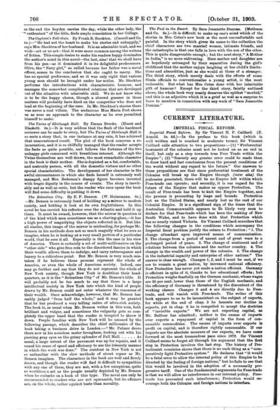C URRENT LITERAT ETRE.
IMPERIAL FISCAL REFORM.
Imperial Fiscal Reform. By Sir Vincent H. P. Caillard. (E.. Arnold. 3s. 6d.)—In the preface to this book (which is well written and is couched in moderate terms) Sir Vincent Caillard calls attention to two propositions :—(1) "Preferential treatment of the colonies must not be looked on as an end is itself, but only as a step towards true Free Trade within the Empire"; (2) "Scarcely any greater error could be made than. to draw hard and fast conclusions from the present conditions of the world without any regard to the future." Our answers to these propositions are that since preferential treatment of the. Colonies will break up the Empire through (inter cilia) the jealousies generated, there will be no Empire left within which. Free-trade can operate ; and secondly, it is our regard for the future of the Empire that makes us oppose Protection. The result of Free-trade has been to knit the Empire together, and the process is proceeding by leaps and bounds. Protection lost us the United States, and nearly lost us the rest of our Colonial Empire. It is a significant sign of the times that the Australian Commonwealth appears to ge likely very soon to declare for that Free-trade which has been the making of New South Wales, and to have done with that Protection which has so nearly ruined Victoria. Sir Vincent Caillard considers that the following changes in the conditions which accompany the Imperial fiscal problem justify the return to Protection : " 1. The change attendant upon improved means of communication. 2. The change from a period of unrest and of great wars to a prolonged period of peace. 3. The change of sentiment and of relations between the colonies and the mother country. 4. The change in the wealth and power of the colonies. 5. The change in the industrial capacity and enterprise of other nations." The answer is clear enough. Changes 1, 2, and 5 must be met, if we are to remain a great nation, by increased national efficiency. Now Protection has never yet made a nation efficient. Germany is efficient in spite of it, thanks to her educational efforts ; but Protection weighs fearfully on the German mechanic, whose wages are 30 per cent. lower than those of the English mechanic, and the efficiency of Germany is threatened by the discontent of the working classes. Changes 3 and 4 are directly due to Free- trade, and will vanish with Free-trade. The writer of this book appears to us to be inconsistent on the subject of export's, for while at the end of chap. 3 he laments our decline in exports, yet in chap. 6 he is compelled to accept the doctrine of "invisible exports." We are not exporting capital, as Mr. Balfour has admitted ; neither is the excess of imports over exports a repayment of capital in the form of con- sumable commodities. The excess of imports over exports is profit on capital, and is therefore rightly consumable. If our imports are the absolute measure of our exports, we have come forward at the most tremendous pace since 1872. Sir Vincent Caillard seems to forget all through his argument that the first step in Protection involves the last step. The history of Pro-. tectionist countries shows that there is no such thing as a "com- paratively light Protective system." He declares that "it would be a fatal error to allow the internal policy of this Empire to be directed by the feeling of foreign nations," but he fails to see that this would be involved in the adoption of a necessarily pro- gressive tariff. One of the fundamental arguments for Free-trade is that we will allow no interference in our internal policy. Free- trade has prevented such interference ; Protection would en- courage both the Colonies and foreign nations to interfere.


















































 Previous page
Previous page